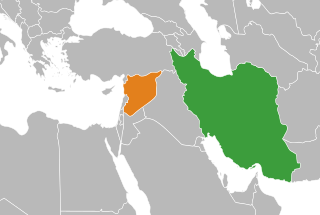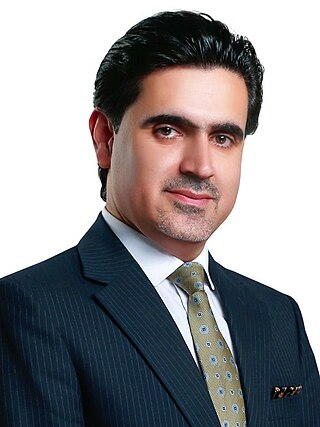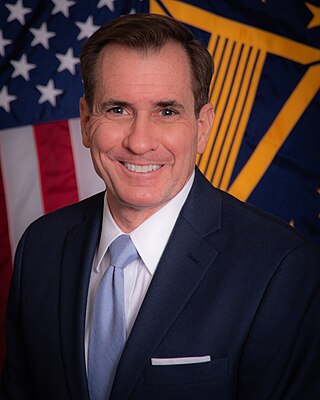
The Islamic Republic of Pakistan maintains a large network of diplomatic relations across the world. Pakistan is the second largest Muslim-majority country in terms of population and is the only Muslim majority nation to have possession of nuclear weapons.

Foreign relations of Saudi Arabia are the diplomatic and trade relations between Saudi Arabia and other countries around the world. The foreign policy of Saudi Arabia is focused on co-operation with the oil-exporting Gulf States, the unity of the Arab+ World+, Islamic+ solidarity, and support for the United Nations. In practice, the main concerns in recent years have been relations with the US, the Saudi Arabian–led intervention in Yemen, the Israeli–Palestinian conflict, Iraq, the perceived threat from the Islamic Republic of Iran, and the effect of oil pricing. Saudi Arabia contributes large amounts of development aid to Muslim countries. From 1986 to 2006, the country donated £49 billion in aid.

The foreign relations of Iran are the economic and diplomatic relationships between the Iranian government and governments of other countries. Geography is a very significant factor in informing Iran's foreign policy. Following the 1979 Iranian Revolution, the newly formed Islamic Republic, under the leadership of Ayatollah Khomeini, dramatically reversed the pro-American foreign policy of the last Shah of Iran Mohammad Reza Pahlavi. Since then the country's policies have oscillated between the two opposing tendencies of revolutionary ardour to eliminate Western and non-Muslim influences while promoting the Islamic revolution abroad, and pragmatism, which would advance economic development and normalization of relations. Iran's bilateral dealings are accordingly sometimes confused and contradictory.

Sayyid Kamal Kharazi is an Iranian reformist politician and diplomat who was the Minister of Foreign Affairs from 20 August 1997 to 24 August 2005 as appointed by President Mohammad Khatami serving for eight years. He was replaced by Manouchehr Mottaki who was appointed by the next President Mahmoud Ahmadinejad. He is currently member of the Expediency Discernment Council.

The Cooperation Council for the Arab States of the Gulf, also known as the Gulf Cooperation Council, is a regional, intergovernmental, political, and economic union comprising Bahrain, Kuwait, Oman, Qatar, Saudi Arabia, and the United Arab Emirates. The council's main headquarters is located in Riyadh, the capital of Saudi Arabia. The Charter of the GCC was signed on 25 May 1981, formally establishing the institution.

Ali Akbar Velayati is an Iranian conservative politician and physician. He is currently a member of the Expediency Discernment Council. Velayati is a distinguished professor at Shahid Beheshti University of Medical Sciences, senior adviser to the Supreme Leader in international affairs and head of the board of founders and the board of trustees of the Islamic Azad University.

Mohsen Rezaee is an Iranian conservative politician affiliated with the Resistance Front of Islamic Iran and senior military officer in the Islamic Revolutionary Guard Corps, who is currently a member of the Expediency Discernment Council, secretary of the Supreme Council for Economic Coordination, as well as the secretary of the Iranian government's Economic Committee. He was secretary of the Expediency Discernment Council from 1997 to 2021 and Vice President of Iran for Economic Affairs between 2021 and 2023.

Karim Sanjabi was an Iranian politician of National Front.
Flynt L. Leverett is a former senior fellow at the New America Foundation in Washington, D.C., and a professor at the Pennsylvania State University School of International Affairs. From March 2002 to March 2003, he served as the senior director for Middle East affairs on the National Security Council (NSC).

Iran–North Korea relations are described as being positive by official news agencies of the two countries. Diplomatic relations improved following the Iranian Revolution in 1979 and the establishment of an Islamic Republic. Iran and North Korea pledge cooperation in educational, scientific, and cultural spheres. Some media reports claim this cooperation extends to nuclear cooperation, though official U.S. government publications and academic studies have disputed this. The United States has been greatly concerned by North Korea's arms deals with Iran, which started during the 1980s with North Korea acting as a third party in arms deals between the Communist bloc and Iran, as well as selling domestically produced weapons to Iran, and North Korea continues selling missiles to Iran. North Korea and Iran are the remaining two members of George W. Bush's "Axis of evil", which has led to many of the concerns regarding Iran–North Korea relations.

The Ministry of Foreign Affairs is a ministry of the Government of Pakistan tasked in managing Pakistan's diplomatic and consular relations as well as its foreign policy. The MOFA is also responsible for maintaining Pakistani government offices abroad with diplomatic and consular status.

Sayyid Mostafa Agha Mirsalim is an Iranian engineer and conservative politician. He is currently member of the Expediency Discernment Council and also a member of Islamic Consultative Assembly.

Syria and Iran are strategic allies. Syria is usually called Iran's "closest ally", with ideological conflict between the Arab nationalism ideology of Syria's secular ruling Ba'ath Party and the Islamic Republic of Iran's pan-Islamist policy notwithstanding. Iran and Syria have had a strategic alliance ever since the Iran–Iraq War, when Syria sided with non-Arab Iran against neighbouring Ba'ath-ruled Iraq. The two countries shared a common animosity towards then Iraqi president Saddam Hussein and coordination against the United States and Israel.
Shireen Tahmaaseb Hunter is an independent scholar. Until 2019, she was a Research Professor at the Center for Muslim-Christian Understanding (ACMCU) at Georgetown University in Washington, D.C., with which she had been associated since 2005, as Visiting Fellow and then Visiting Professor. She became an honorary fellow of ACMCU in September 2019.

Dr. Faramarz Tamanna is a university professor, writer, an Afghan politician and the chancellor of the University of Afghanistan in Kabul. He was Director General of the Center for Strategic Studies of the Ministry of Foreign Affairs (Afghanistan). He holds his PhD from Jawaharlal Nehru University in International Studies.

John F. Kirby is a retired United States Navy rear admiral serving as Coordinator for Strategic Communications at the National Security Council in the White House since late May 2022. He previously served as Pentagon Press Secretary for the first year and a half of the Biden administration, and worked as a military and diplomatic analyst for CNN from 2017 to 2021. He served in the Obama administration as the spokesperson for the United States Department of State from 2015 to 2017.
The Centre for Strategic and Diplomatic Studies (CSDS) is a research institute with a domestic focus on Tunisian politics, security, and economics and a regional focus on the Middle East and North Africa.
Dashdorj Bayarkhuu is a Mongolian research professor, columnist and writer and former ambassador of Mongolia to Egypt. Prior to his nomination to the ambassadorial position, Bayarkhuu worked in media, defense, diplomatic and educational sectors. After his tenure as ambassador in Cairo, Bayarkhuu returned to academic field as a Visiting Professor of International Politics and Contracted Researcher. He joined the Ministry of Foreign Affairs of Mongolia as Deputy Director, Policy Planning & Co-ordination Department in 2015–2016.

Mehdi Sanaei is an Iranian academic, politician, Professor in University of Tehran and Ambassador Extraordinary and Plenipotentiary of the Islamic Republic of Iran to the Russian Federation (2013–2019). Sanaei was lawmaker at Iran’s Islamic Parliament (Majlis) from 2008 to 2013. He was Senior Adviser to the Iranian Ministry of Foreign Affairs 2019-2022















